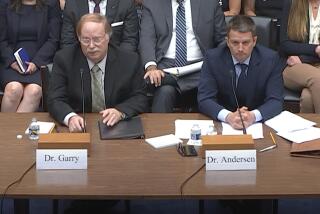Judge Rejects Claims Iran-Contra Testimony Is Tainted
- Share via
WASHINGTON — The accused conspirators in the Iran-Contra case moved a step closer to trial Thursday when a federal judge dismissed their claims that a special prosecutor had improperly built his case on the immunized congressional testimony of three of them.
In rejecting defense arguments that the prosecution’s case is legally tainted, U.S. District Judge Gerhard A. Gesell said independent counsel Lawrence E. Walsh “has at all times proceeded in good faith, taking strenuous precautions to safeguard the defendants’ Fifth Amendment rights.”
The ruling removed one of the last major obstacles to starting the first of four trials, that of retired Marine Lt. Col. Oliver L. North, by September.
Besides North, the other defendants who gave immunized testimony last summer to a joint congressional hearing were North’s boss, fired National Security Adviser John M. Poindexter, and Albert A. Hakim, an American businessman born in Iran.
Secord Joins Claims
The fourth defendant, retired Air Force Maj. Gen. Richard V. Secord, testified before Congress without a grant of immunity. But Secord joined in claims that Walsh had used the immunized congressional testimony of his co-defendants to build the case against all four.
Walsh contended in pretrial hearings earlier this year that he had taken careful steps to keep a federal grand jury that indicted the men from hearing or learning about their nationally televised testimony to Congress. He said the prosecution’s case was built entirely on evidence gathered independently of the congressional testimony, and Gesell agreed with that in his ruling.
Gesell said the defendants’ “immunized testimony did not serve to enhance the focus of independent counsel’s investigation.”
Walsh acknowledged earlier this year that some of his prosecutors had been exposed inadvertently to snatches of congressional testimony, an admission that some defense attorneys contended would taint the whole case. But Gesell agreed with Walsh that such breaches had been insignificant.
Finds No Infringement
“The inquiry has disclosed no action by the government that has infringed the protection granted each . . . defendant against the direct or indirect use of his compelled testimony, and no basis has appeared (during) pretrial to warrant dismissal of any immunized defendant,” Gesell said in a 34-page opinion.
“Defendants’ immunized testimony was not submitted to the grand jury in any form,” he added.
All four defendants are charged with conspiring to defraud the government through secret sales of arms to Iran in 1985 and 1986 and then diverting the profits to help the rebel Contra forces in Nicaragua.
North and Poindexter, in addition, are charged with obstruction of justice.
‘Prepared to Go Forward’
Walsh said he was pleased by Gesell’s ruling, adding that “we are prepared to go forward as directed by the court.” Gesell has said that by July 1 he would like to decide on a date for North’s trial, with separate trials for the other three to follow.
The judge previously ruled that four trials instead of one must be held so that each defendant, if he wishes, may use the immunized testimony of his colleagues to help defend himself without such testimony infringing upon a fair trial for those colleagues.
Although defense attorneys may appeal Gesell’s ruling on the taint issue, the U.S. Circuit Court for the District of Columbia has previously held that a judge may reconsider such an issue after a trial has concluded, a procedure Gesell has suggested.
Some Complaints Pending
Gesell still must resolve complaints by defense attorneys that they are receiving insufficient classified documents for their clients from an inter-agency screening committee. He must also rule on complaints by these lawyers that under the Classified Information Procedures Act of 1980 they must give the prosecution notice of any classified information they plan to use at trial.
Defense attorneys have argued that complying with this law would force them to disclose the heart of their case before trial and would violate their clients’ constitutional rights to a fair trial.
More to Read
Sign up for Essential California
The most important California stories and recommendations in your inbox every morning.
You may occasionally receive promotional content from the Los Angeles Times.













